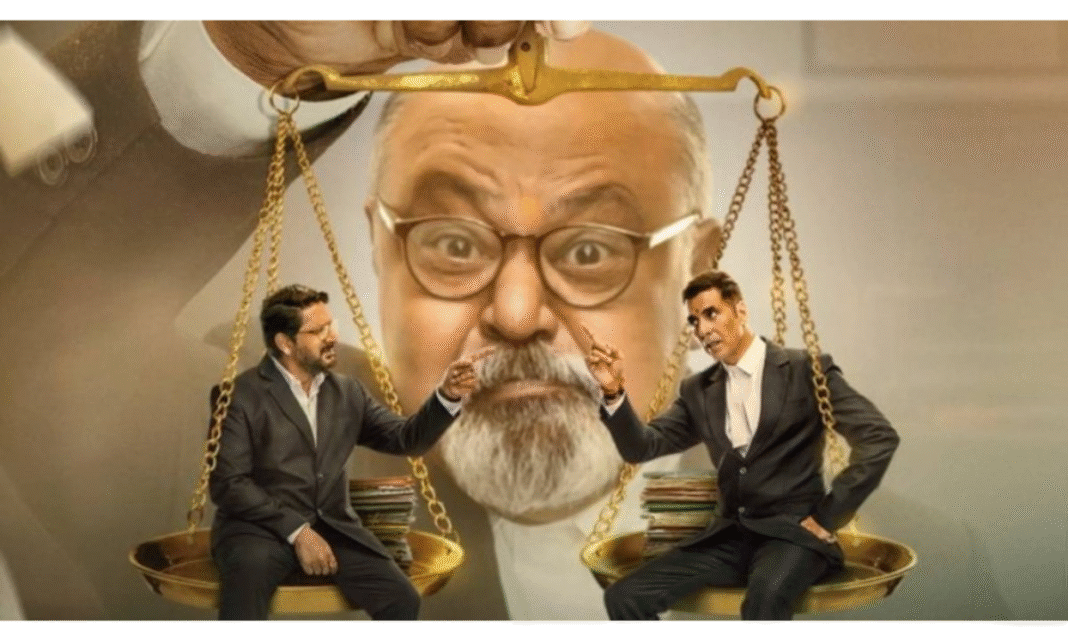The gavel strikes again, and Subhash Kapoor’s Jolly LLB 3 enters the courtroom with a heavier case file than ever before. Following the cult status of Jolly LLB (2013) and the star-driven Jolly LLB 2 (2017), expectations were sky-high. This time, the twist is tantalising: both Jollys—Arshad Warsi’s street-wise Jagdish Tyagi and Akshay Kumar’s more polished Jagdishwar Mishra—lock horns before none other than the inimitable Judge Sunder Lal Tripathi, played by Saurabh Shukla.
It’s courtroom comedy, satire, and social commentary rolled into one; but more importantly, it’s a reminder that justice isn’t just about law—it’s about people, dignity, and the cruel weight of systemic indifference.
Plot: A Tale of Two Jollys, One Broken System
The film kicks off in Bikaner, where a farmer’s fight to retain ancestral land spirals into tragedy, culminating in suicide. Years later, his widow Janki Rajaram Solanki (Seema Biswas, hauntingly restrained) seeks justice, dragging her grief into Delhi’s unforgiving legal corridors.
Enter Jolly Tyagi (Warsi)—reluctant, cynical, money-minded yet human enough to be moved—and soon after, Jolly Mishra (Kumar), who sees law as both profession and calling. What follows is a fiery courtroom duel: sharp cross-examinations, quips, banter, and moral tightropes.
The farmer’s widow becomes more than just a client—she is conscience itself, standing against corruption, bureaucratic apathy, and predatory power. The Delhi courtroom becomes a colosseum, with the judge acting not just as referee but philosopher, jester, and moral compass.
Performances: A Masterclass in Balance
Akshay Kumar slips into his Jolly with trademark charisma—commanding in serious exchanges, cheeky in lighter beats. His emotional gravitas, especially in the second half, lands well.
Arshad Warsi, the soul of the original, shines again—wry, rooted, carrying the weariness of someone who has seen ideals crushed before. His comic timing remains effortless, but it’s his vulnerability that stays.
Saurabh Shukla steals the show. Tripathi isn’t just a judge—he’s the conscience of the franchise, a man who humanises law even as he ridicules its absurdities. Every line he delivers is gold.
Seema Biswas is heartbreaking, embodying grief without melodrama. Her presence anchors the film in emotional reality.
Huma Qureshi and Amrita Rao add texture but are underutilised, a missed opportunity in a film that otherwise values layered characters.
Supporting turns from Gajraj Rao and Ram Kapoor sharpen the systemic critique.
Analysis: Wit Meets Wound
Balancing humour with hard-hitting social commentary is a tightrope act, and Kapoor manages it for the most part. The first half leans more on comedy, familiar franchise beats, and repartee between the two Jollys. The second half turns sombre, weaving in land rights, farmers’ plight, and systemic corruption with unflinching focus.
The tonal shifts sometimes jar—the laughter doesn’t always cushion the tragedy—but when it works, it’s devastatingly effective. Some pacing drags occur in the middle, with a song or two diluting intensity. Yet, the screenplay never loses sight of the central question: What is justice when the scales are rigged?
Cinematographer Rangarajan Ramabadran contrasts rural desolation with the courtroom’s stifling order. The dialogues—sharp, witty, and biting—are the true star. Judge Tripathi’s repartee, the Jollys’ sparring, and the widow’s quiet dignity form the film’s emotional spine.
Verdict: A Franchise Worth Fighting For
Jolly LLB 3 doesn’t just play safe with comedy and courtroom gimmicks. It dares to get heavier, more tragic, more socially resonant—without losing the humour that made the series tick. Imperfections remain: underwritten female arcs, slight drag, tonal mismatches. Yet the performances elevate the film to something memorable.
It is, above all, Saurabh Shukla’s show, with Kumar and Warsi circling him in a dynamic tug of wit and conscience.
Critics’ Rating: ⭐⭐⭐⭐ (4/5)
Box Office Rating: ⭐⭐⭐ (3/5)


